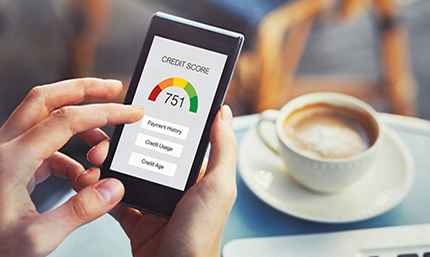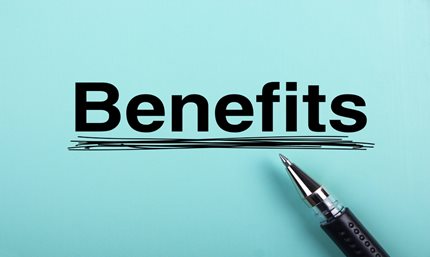News & Tips
Building Credit with a Secured Credit Card

When you’re seeking a Visa® card and all its conveniences—but facing a roadblock with a lack of credit history—a secured credit card can help.
With a secured credit card, cardholders deposit a specific amount of cash that serves as “collateral” for the card issuer, which usually goes into a savings account at the card issuer’s institution. This makes secured credit cards a good option for people who lack a credit history or need to rebuild their credit. Cardholders then have the opportunity to show the financial institution how responsible they can be with their credit card usage and debt.
The cardholder’s credit history will also often appear on the three credit bureaus’ reports: Experian, TransUnion, and Equifax. When this reporting happens, it can help cardholders build or rebuild their credit history and scores.
Best Way to Build Credit
Secured credit cards can be one of the best ways to build or rebuild credit as long as you make payments on time. It also makes sense to keep your balance at a reasonable level because the utilization factor, or how much available credit you’re using, factors into credit scores. Paying off your balance in full each month will not only help with building your credit, but will also allow you to avoid paying interest on your account.
Secured credit cards can be easier to get, too. When lenders review applications, they consider how much risk is involved in providing the applicant with loan funds or a credit limit. With a secured card, it’s often a lower risk for the lender to issue the card because the funds in the savings account serve as a backup. Plus, at Space Coast Credit Union (SCCU), we don’t require a minimum credit score to get a secured credit card.
Once the borrower shows their creditworthiness, the financial institution will usually release the funds and offer options for an unsecured form of credit (not tied to any collateral).
In short, a secured card can be an excellent stepping stone into the world of credit, giving you time to build credit and learn good money management practices. As you pay your secured credit card on time and otherwise follow good financial habits, your credit score can go up—which in turn can help you to qualify for better interest rates and have easier access to loans.
By paying less interest and fewer fees on loans, you’ll be able to save more money (and maybe even invest it). Plus, a better credit score often means you can get lower insurance rates. Overall, being able to save more in the long run can help offset the effects of inflation.
Visa® Secured at SCCU
At SCCU, you can apply for a Visa® Secured when you need to build your credit. The minimum deposit requirement is $300 (for the collateral), with a maximum credit line of $3,500.
The card comes with low variable interest rates, but if you pay the balance in full each month, you won’t have to worry about interest charges. After a year of good payment history, you may be eligible to apply for a Visa® Platinum.
Our Visa Secured has no annual fee, no balance transfer fee, and no cash advance fee. This card also features a Visa® Zero Liability Policy14, so you’re not responsible for unauthorized charges.
Other benefits include:
- Free 2Way Text Fraud Alerts
- Contactless payments
- Free FICO® credit score
- Digital wallet payment options
- Manage Cards in Online & Mobile Banking
Apply for your Visa Secured today.
Building Up Your Credit
First, the idea of paying something on credit means you don’t pay cash or write a check for an item. Instead, you make purchases of goods or services and pay for them at a later time. The two main types of credit today: revolving credit and installment credit accounts.
- Installment loans: These can be mortgages, car loans, personal loans, and so forth. The borrower takes out a certain amount of money with a stated interest rate and term, and then they make monthly payments as they pay the balance down and then off.
At first, more of the payment typically goes towards the interest owed to the financial institution, and the remainder goes towards the principal; over time, more goes to the principal, causing the outstanding balance to go down more quickly later in the installment loan. - Secured loans: Learn more about the difference between secured credit cards and secured loans.
- Revolving credit: A credit card and a home equity line of credit are examples of revolving credit. Borrowers receive a credit limit, and they can spend up to that limit, making payments when there is a balance and then having the ability to use the revolving credit account again up to the limit.
If you make payments on time, then this can make your credit reports look more positive. The three major credit bureaus (Equifax, Experian, and TransUnion) collect payment information from credit issuers. Each of the bureaus generate credit scores from these reports, which are generally three digits, and allow lenders to get a quick snapshot of how well a person has managed credit in the past. Because there are so many credit-scoring models that weigh certain credit factors from these reports, you actually have multiple credit scores that vary.
The FICO® Score is often the standard for financial institutions to make credit-awarding decisions. Higher credit scores tell a lender that the borrower has responsibly managed credit cards and loans in the past. This can be a good predictor of future behavior.
FICO® Scores range from 300 to 850, with 700 being an average. Having a higher score makes it easier to get a loan or credit card, typically with better interest rates. More specifically:
- Poor: 300-569
- Fair: 570-669
- Good: 670-739
- Very good: 740-799
- Exceptional: 800-850
Credit scores are calculated using algorithms. Here are factors for the FICO® Score:
- Payment history: This is the biggest factor, accounting for 35% of the score. Paying minimum payments on your credit cards and loans on time is the best way to improve your credit scores.
- Credit utilization: This is the second factor, accounting for 30% of the FICO® Score. Add up the credit limits on revolving credit accounts and compare how much you owe on them. It can be helpful to keep usage to under 30% of credit limits.
- Credit history length: This accounts for 15% of your FICO® Score, meaning how long you’ve had credit accounts and how recently you’ve used them. Longer histories help with credit scores.
- Credit mix: This accounts for 10% of your FICO® Score; having different types of credit (such as installment and revolving) can help with the mix.
- New credit: This takes care of the remaining 10%. If you open up too many accounts in a short amount of time, this can be a red flag.
If credit scores are too low, it can be difficult to get credit. Fortunately, credit cards with no credit history exist, such as SCCU’s Visa® Secured.
A Look at Debt-to-Income Ratios
Generally, better credit histories and scores make borrowing at better interest rates easier. Additionally, lenders will look at borrowers’ debt-to-income ratio, or DTI.
To calculate your debt-to-income ratio (DTI):
- First, add up your total of monthly debt payments, such as mortgage or rent, car loans, personal loans, credit card debt, and so forth.
- Next, calculate your monthly gross income (the amount before taxes).
- Then, divide the total of your monthly debts by your total monthly income. The result is your DTI percentage.
When you’re ready to borrow money, be sure to find out what maximum DTI a lender will allow for the kind of loan you’re seeking. If yours is too high, then you can focus on paying down debt to get it in line with your income. This worksheet can help too.
Benefits of Credit Unions
Credit unions are not-for-profit organizations that focus on helping members instead of focusing on making a profit. In addition to credit unions providing members credit cards with no credit history, they also offer low-rate loans with no or low fees.
To become a member, you simply need to meet their qualifications (such as live or work in a certain geographic location) and open an account; then, you can proceed with confidence knowing that you’re a member-owner and part of a cooperative.
Deposits at a credit union are insured through the National Credit Union Administration (NCUA) like the FDIC does for accounts at traditional banks. This provides more assurance that the money you deposit is secure.
Here’s another benefit of credit unions: members typically receive service that offers more of a personal touch. Plus, credit unions often support their local communities in a variety of ways. Learn more about credit unions vs. banks here.
Financial Wellness at SCCU
Our credit union has a strong focus on helping our members achieve financial wellness. Offering the easiest to get credit cards—Visa® Secured—can be the best way to build credit. Other ways we help include:
- Budgeting worksheet: This helps you to look at your finances in a useful way, focusing on the money you bring in and the debt paid out, and assisting you in creating a good balance.
- Credit score worksheet: Through SCCU online banking, you can have access to your FICO® Score for free, with scores updated monthly. Did you know that you can get a free credit report from each major credit bureau annually here? Review and contact bureaus that have inaccurate information about you and ask for corrections.
- Fraud Prevention Center: Find tips on how to protect your accounts and monitor for fraudulent behavior.
- Home Buying Center & Auto Buying Center: These pages can help you make better decision about financing these big purchases.
- Financial calculators: Get a better idea of what your monthly car or home loan payment would be and so much more with our full suite of financial calculators.
These are just some of the ways we help you to manage and improve your financial picture, besides our best credit-building credit cards.
Credit Cards at SCCU
In addition to offering unsecured credit cards that can help build credit, we provide a range of credit cards to suit all needs:
- Visa Signature®: Cardholders can earn points on every purchase43. Then, they can redeem these points for entertainment purposes, gift cards, cash back, and more. Plus, this card offers lots of benefits for travel-goers.
- Visa® Platinum: If you start with our Visa Secured to build your credit, you can apply for this card after a year of timely payments. The Visa® Platinum has low variable rates and cashback rewards33.
- Visa® Low Rate: This card offers the lowest interest rate of all of our credit cards, which comes in handy if you need to carry a balance on your account, especially for any emergencies or big trips.
- Visa® Student: This is another of our best credit building credit cards, available for students to build a good credit history and learn about financial wellness. This is tailor-made to help teenagers use credit cards and manage debt as they transition to adulthood.
If you have any questions about our credit cards for no credit history, please feel free to fill out this form or reach out to us by phone or LiveChat.





















































